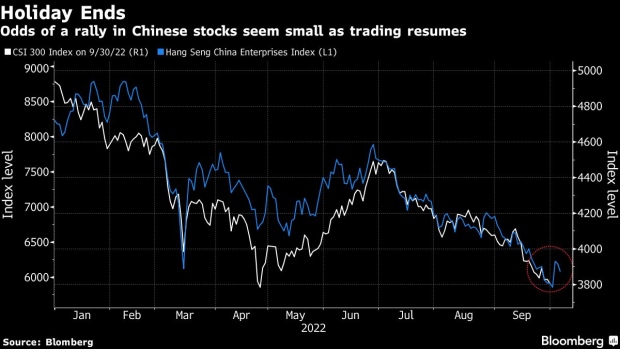Oct 8, 2022
Covid’s Shadow Looms Large Over Any Post-Holiday China Gains
, Bloomberg News

(Bloomberg) -- Chinese traders returning from the Golden Week holiday are set to face a raft of conflicting signals, mitigating the market’s chances of playing catch-up to the small advance seen in global stocks.
Having started last week with its best two-day rally since April 2020, a gauge of world equities finished the period with a gain of just 1.7% as Friday’s solid US jobs figures sent shares tumbling again on renewed bets for aggressive Federal Reserve rate hikes. While the Hang Seng China Enterprises Index of Chinese stocks in Hong Kong is up nearly 3% since onshore shares last traded at the end of September, it closed before Friday’s US data. The offshore yuan has had a tiny weekly gain versus the dollar.
Traders in China will also find it hard to ignore the grim reality facing the world’s second-biggest economy, with data Saturday showing services activity contracted for the first time in four months. Other trends last week showed a sharp slide in holiday spending, a rebound in virus cases and no respite from the property crisis. The CSI 300 Index, mainland China’s equity benchmark, went into the weeklong break near its lowest since April 2020.
READ: Amundi Slashes China Stocks Citing Covid and Housing Problems
Tensions with the US remain to the fore with China criticizing expanded restrictions on its access to semiconductor technology, which were announced by President Joe Biden’s administration on Friday.
Meanwhile, the upcoming Communist Party Congress will likely keep some hopes alive for further policy stimulus, especially as consumer demand continues to weaken in the face of Covid curbs. Bloomberg Intelligence expects consumer, tech, auto, transportation and infrastructure sectors to be among the potential beneficiaries.
“The focus will be back to China specific challenges - Covid Zero and the ailing property market,” said Hao Hong, Hong Kong-based partner and chief economist at Grow Investment Group.
READ: China Traders See Property Boost, Covid Zero Resolve at Congress
Here is what to watch out for markets when trading resumes Monday:
Equities
Traders will be assessing the economy’s recovery momentum from spending data during the holiday, which doesn’t offer a lot of encouragement. Travel plans have been disrupted as several cities were locked down and visitors stranded following Covid flareups at tourism spots.
Tourism revenue declined 26% to 287 billion yuan ($40.3 billion) over the week-long holiday from a year ago. Compared with pre-pandemic levels in 2019, revenue was down nearly 56%, and even worse than last year’s 40% decrease from 2019 levels, according to figures from the official social media account of the Ministry of Culture and Tourism.
Roughly 422 million trips were taken, down 18% from last year and 39% from 2019 levels.
READ: China Shows Soft Travel Trend During Golden Week Holiday: Citi
Without firm conviction of a market bottom, traders will be hesitant to build positions ahead of the twice-a-decade political gathering that starts Oct. 16, where leadership will be confirmed and key policies unveiled. The CSI 300 has fallen 23% in 2022, heading for its first back-to-back annual declines in a decade.
There’s been some “bottom fishing and short covering, especially for reopening names, but very limited new position building given so many false starts this year,” said Xiadong Bao, fund manager at Edmond de Rothschild Asset Management in Paris. “Skepticism and wait-and-see attitude is the mainstream mentality for foreign investors.”
READ: Wall Street Desire for Xi to Pivot to Growth Faces Reality Check
Yuan Fixing
The offshore yuan capped a small gain last week after seven weeks of declines. That could lend some support to the onshore currency, which touched the lowest since 2008 before the holiday.
Traders will be closely watching the People’s Bank of China’s daily yuan fixing at 9:15 a.m. in Beijing. The central bank had set a record run of stronger-than-expected fixes prior to the holiday in order to curb the currency’s selloff.
A weakening yuan, coupled with a reversal in yield gap between the US and China following a series of Fed hikes, has spurred concerns over capital outflows. China’s forex reserves as of end-September fell to the lowest since 2017.
“The drop in mobility during the National Day holidays could translate into weaker retail sales, but yuan bears could be reined in not just by the PBOC’s guidance but also on anticipation of any other significant growth-boosting policy shifts from the Party Congress,” said Fiona Lim, foreign exchange strategist at Malayan Banking Bhd in Singapore.
Credit Slump
China’s offshore credit saw renewed panic selling while onshore traders were away, as a slump in dollar notes of CIFI Holdings Group Co., the nation’s 15th-largest developer by contract sales, tested market confidence.
Investors are focusing on further indication from CIFI on how it can address debt issues. The firm had its ratings cut by Moody’s Investors Service on refinancing risks.
Bondholders are also seeking more details from previous support measures, including an urge from China’s top financial regulators to six major banks to offer financing support to the real-estate sector.
That delivered a short-term boost in sentiment but isn’t “sufficient to support the market,” said Andy Suen, a portfolio manager and head of Asia ex-Japan credit research at Pinebridge Investments Asia Ltd. “We remain very defensive in our positioning in the sector.”.
(Updates with services data, US semiconductor tensions.)
©2022 Bloomberg L.P.





